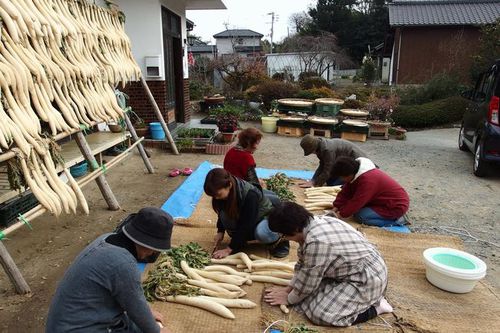Organic Farming in Abandoned Farmland in Fukushima

Copyright Orihime-no-Kai All Rights Reserved.
Tohoku Fukko Nikki (Tohoku Reconstruction Diary), a weekly feature in the Tokyo Shimbun newspaper, delivers news stories on reconstruction efforts in communities devastated by the earthquake and tsunami that struck Japan in March 2011. The articles are written by the JKSK Yui-Yui Project, an initiative to support survivors of the 2011 disaster. This time, we present the effort to utilize abandoned farmlands.
I am a leader of "Orihime-no-Kai" set up in January 2017, in Iwaki City, Fukushima Prefecture. We have 10 members and have been performing a variety of activities.
Iwaki City suffered substantial damage in the March 2011 earthquake and tsunami, which led to radiation contamination after the nuclear accident, and harmful rumors that forced the city's agriculture sector into hardship. Along with a shortage of successors, more and more affected farmland became abandoned. Under such circumstances, the Fukushima Organic Cotton Project was launched in 2012, and started cultivating native brown cotton using organic farming methods, without using agricultural chemicals or fertilizers.
After nearly 40 years of working as an elementary school teacher, wishing to work on farmland after retirement, I started to help my daughter's acquaintance, a farmer cultivating brown cottons and organic vegetables.
We planted seeds of daikon (Japanese radish), took care of them and harvested them. We then dried and pickled the daikon with my acquaintances. The pickled daikon were the sweetest and most tender that I have ever eaten, and we thoroughly enjoyed eating them.
I drove a tractor and operated a cultivator, which I had never done before. In July, I enjoyed harvesting potatoes together with the members of Orihime-no-Kai, their families, and volunteers from various industries.
I considered making yarn from the raw cotton that we grew, and making something to from it using the weaving skills I had learned. That idea was realized this year. At first we were doing poorly, and I discussed the issue at gatherings, trying again and again to produce yarn. Little by little, we were able to produce yarn from our cotton. How impressive it is when raw cotton becomes thread!
Every day we spin cotton into thread to make light shades for votive lights. We are going to hold a memorial event to use these lights in March 2018, seven years have passed since the disaster struck Japan. I would like to continue to grow cotton, spin it into thread and make a variety of things.
Kumiko Tomita
President of Orihime-no-Kai
Japan for Sustainability (JFS) is a non-profit communication platform to
disseminate environmental information from Japan to the world. We are
grateful that people in 191 countries have found an interest in our free
e-mail publications, and will continue to do our best to deliver useful
information to our readers all around the globe.
Please feel free to forward this message to your colleagues and friends
wherever the Internet can reach. If you know colleagues or friends there
with an interest in sustainability, please do forward them one of our
newsletters and invite them to try our service. To subscribe for JFS
Newsletters, visit www.japanfs.org/en/newsletter/subscribe.html

If you find our information and activities unique and valuable,
we appreciate your support!
http://www.japanfs.org/en/join/donation.html

Use this form http://www.japanfs.org/acmailer/unsubscribe.html to
remove your email address from our mailing list.

We welcome your comments. Please send them to: info@japanfs.org

Japan for Sustainability (JFS)
 |  |  |
Copyright (c) 2018, Japan for Sustainability. All Rights Reserved.

